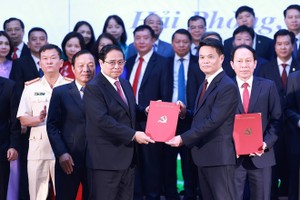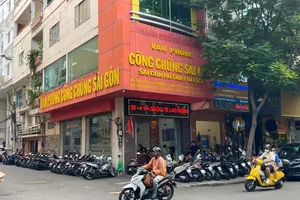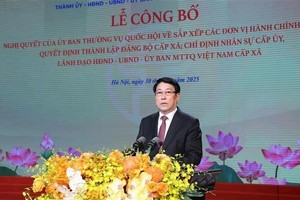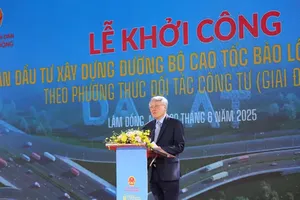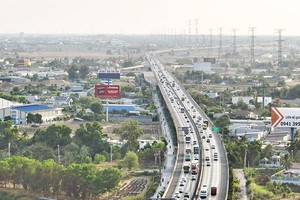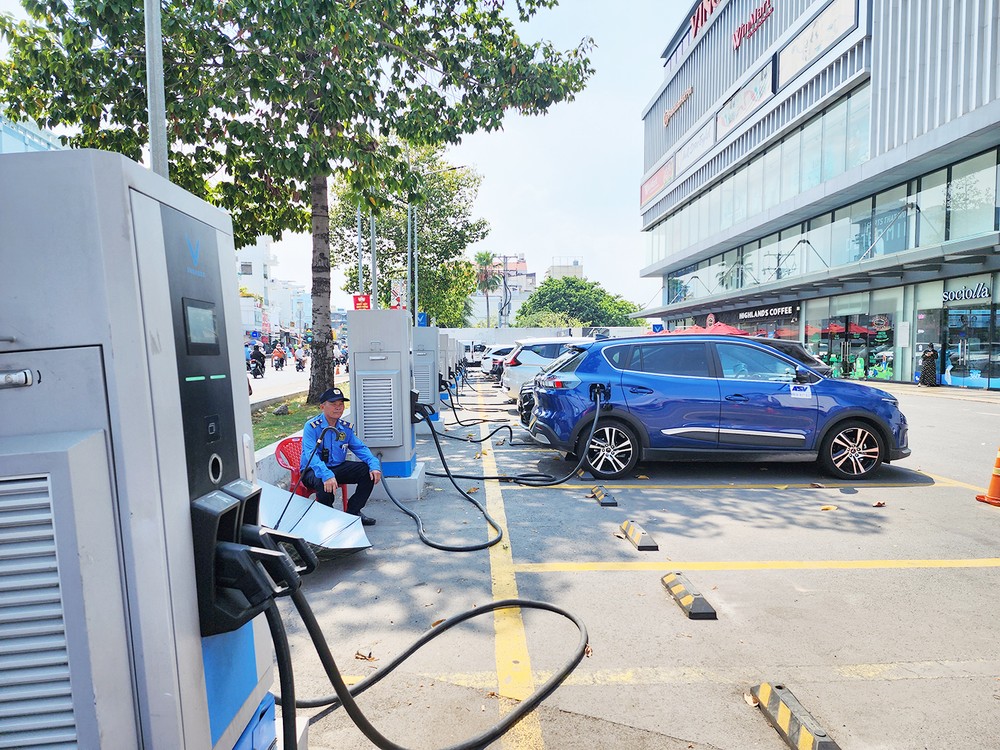
The Transport sector also sets a goal that by 2040, it will gradually limit and eventually stop the production, assembly, and import of cars and motorbikes using fossil fuels. However, the number of public charging stations is currently not enough to meet people's needs.
Resident Nguyen Hai living in the Dreamhome Residence apartment complex in Go Vap District of Ho Chi Minh City said that he really likes electric motorbikes because they run smoothly and they are dust-free and environmentally friendly. However, because he lives in an apartment, he has many difficulties finding a place to charge electricity. The apartment basement does not have a socket to charge the battery, so every day we have to bring the vehicle to the 14th-floor apartment to charge. His 55 square meter apartment has to accommodate a bulky motorcycle, not to mention complaints of residents who also use the elevator, Mr. Hai said.
Worse, one morning he woke up and discovered that the charging cable was loose and not yet connected to the electricity, so he had to rush to catch a motorbike taxi to go to work. Because of many inconveniences, he has returned to using a gasoline motorbike, and an electric car for occasional weekends to go to a coffee shop with his friends.
Faced with residents' need for places to charge motorbikes and electric cars, Mr. Nguyen Thanh Tuan, Head of the Dreamhome Residence Apartment Management Board, shared that currently, the apartment building does not have a plan to charge electric cars while electric motorbike owners must ask sellers to provide charging stations to see what they are like. When there is official information, residents will be notified!
Similarly, the management board of the Orchard Garden apartment building in Hong Ha Street in Phu Nhuan District said that the apartment complex does not have a charging station for cars.
The situation in other apartment buildings is the same as owners of electric vehicles are quite difficult to find places to charge motorbikes and electric cars because most of them are not in the original design and do not have specific regulations and standards. People who want to use motorbikes and electric cars have to find a place to charge themselves, so it is very inconvenient.
Support investors to develop charging station infrastructure
The Ministry of Science and Technology has issued 11 Vietnamese standards on electric vehicle charging stations, including 9 standards on charging stations and two standards on electric vehicle battery exchange. Currently, 18 standards related to electric vehicle charging stations and related electrical equipment such as charging heads, charging cables, and electric vehicle battery charging measuring devices are being developed. In the coming time, the Ministry of Science and Technology will work with other ministries and agencies to study supporting policies which will be submitted to competent authorities so that policies will be promulgated to support investors in developing electric vehicle charging station infrastructure and encourage consumers to use this type of vehicle.
According to experts, the development of charging station infrastructure in Vietnam is generally slow. Currently, only VinFast owns more than 150,000 charging ports, but Vinfast has not released official information about its plan to expand the charging station system in the next phase. In addition, Vietnam's largest electric vehicle company affirmed that it will not share charging station infrastructure with competitors for at least the next 10 years. In addition, a number of energy industry enterprises have begun implementing projects to build and install charging stations and charging ports to serve the needs of people and businesses. However, the scale of these projects is still small.
In Ho Chi Minh City and some neighboring provinces, not only customers buying imported electric cars but also VinFast electric car users are also starting to have difficulty charging their batteries every day. On electric car associations and groups, many people believe that it will not be a problem to make out-of-province trips, or even travel across Vietnam by electric vehicle because VinFast charging stations are available on all highway and rest stops. However, as more and more people buy electric cars, moving around the city begins to have problems. More worth mentioning, since companies have launched electric taxi services and have been racing to invest in battery charging stations, it has led to overcrowded electricity charging stations.
A representative of the Ho Chi Minh City Department of Construction said that the installation of electric vehicle charging stations must comply with basic principles in construction investment activities such as ensuring construction investment according to planning and design, reasonable use of resources and resources, ensuring the correct purpose, vehicle owners and sequence of construction investment; ensuring quality, progress, project safety, human life, health and property; fire prevention, environmental protection.
Installing electric charging equipment must meet specific requirements namely only arrangement in the parking area according to construction designs that have been appraised and issued construction permits according to the present regulations. Moreover, installation in existing works must ensure the requirements do not affect the safety of the structure's load-bearing structure. Plus, charging devices must be evaluated and issued with a certificate of conformity by the authorities according to relevant standards, ensuring disconnection requirements when there is a risk of electric shock, fire or explosion.
Thus, apartment investors can build and install electric vehicle charging stations, however, they need to strictly ensure regulations on fire and explosion prevention, electrical safety, and construction safety to ensure workers’ lives, human health and property and environmental protection. Meanwhile, the Department of Industry and Trade of Ho Chi Minh City is drafting documents providing regulations related to electric charging stations and poles for cars and motorbikes.







